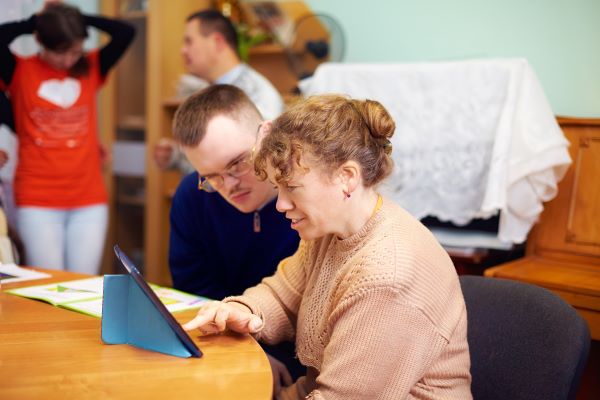Special needs individuals can take advantage of several programs and services offered by the federal…

Providing Guardianship or Conservatorship to Disabled Adults
Adults with developmental disabilities who are unable to make important decisions or care for themselves in adulthood are usually placed in the care of a guardian or conservator. Establishing a legal guardian is the job of the court, which appoints a person (guardian) to make personal and financial decisions for individuals lacking the capacity to make those decisions for themselves. Conservatorship is a similar legal relationship but focuses solely on financial decision-making.
In both cases, the court will refer to the adult with the disability as a protected person or ward and focus on the individual’s best interests. It may limit the authority of the guardian or conservator to only those areas where the individual can’t make decisions.
High School to Adulthood Transition
When parental guardianship ceases at age 18, legal documents must be put in place to permit actions on behalf of adult children. Still, it’s the court’s responsibility to legally appoint the guardian or conservator. Courts mainly look to parents, older siblings, or sometimes outside interested parties for the role. If none exist, a professional guardian or conservator for hire is the next option.
Many students with special needs (intellectual and developmental disabilities) shift to guardianship via high school transition planning. The Individuals with Disabilities Education Act (IDEA) of 1990 says students leaving high school must work with schools and their parent or guardian during the transition when rights transfer to the student as a legal adult. At this time, school officials will often suggest parents become legal guardians to help their adult child navigate life. While courts must consider less restrictive alternatives, like supported decision-making or limited guardianships, typically, full guardianship is granted.
This transition requires planning and considerable thought to the following questions:
- Is full guardianship or conservatorship a requirement? Or can less restrictive alternatives suffice, such as:
- Special Needs Trust
- Family Guidance
- Assistive or Supported Living Services
- Durable Power of Attorney
- Financial Representative
- Limited Conservatorship
- Limited Guardianship
- Temporary Guardian
- Successor Guardian
- Who is the best guardian or conservator candidate to put forward to the court?
- What is the process to obtain guardianship through the court?
- Is there sufficient medical evidence from physicians defining the individual’s capacity?
- What are the power and duties of a guardian or conservator?
How Does a Disability or Special Needs Attorney Help?
A disability attorney or a special needs attorney can assist with setting up guardianship or conservatorship by advising on needs due to the individual’s circumstances and helping determine if a legal arrangement is required. They can prepare the necessary paperwork and file the petition with the court, initiating the guardianship or conservatorship process.
Elder law lawyers may also focus on representing individuals with special needs and their families throughout the process, including attending hearings and communicating with the court. Navigating the legal process can be complex and vary by state. An elder law, disability, or special needs attorney will take all necessary steps and meet all deadlines throughout the legal process.
Importantly, a lawyer can ensure that the individual’s rights are protected throughout, ensuring their best interests are considered and put forward to the court. They can also provide ongoing support and guidance to the guardian or conservator, ensuring that the arrangement continues to meet the individual’s needs. If there are adjustments to be made, a disability or special needs attorney can determine if these actions require court oversight or formal legal changes.
Functions of a Guardian or Conservator
The functions of a guardian or conservator for an adult with developmental disabilities may vary depending on the individual’s needs and the terms of the legal arrangement. Responsibilities may include:
- Making Personal Decisions – A guardian may determine where they live, what medical treatments they receive, and other daily living needs.
- Managing Finances – A conservator may manage finances, including paying bills, managing investments, and ensuring their financial needs.
- Representing the Individual – A guardian or conservator may manage legal or financial matters. Usually, an attorney will advise the guardian or conservator and sometimes represent their position to the court.
- Coordinating Care – The guardian or conservator may coordinate health care, ensuring they receive the support they need.
- Advocating for the Individual – The guardian or conservator may advocate to ensure rights and interests are protected.
The specific responsibilities of a guardian or conservator will depend on the terms outlined in the legal arrangement for the person with special needs. Choosing these participants with care is important as they carry great responsibility.
Federal Programs, Guardianship, and Conservatorship
Guardians and conservators must ensure the individual with a developmental disability’s federal, state, and local program qualifications are maintained. They may need to interact with these programs in several ways:
- Applying for Benefits – A guardian or conservator can assist with the application process for federal programs such as Social Security Disability Insurance (SSDI) or Supplemental Security Income (SSI), which provide financial support.
- Managing Benefits – The guardian or conservator may be responsible for managing government benefits within program guidelines.
- Coordinating with Other Programs – The guardian or conservator may also need to coordinate with other federal programs, such as Medicaid or Medicare, to ensure additional support.
- Representing the Individual – The guardian or conservator may represent or retain an elder law, disability, or special needs attorney for interactions with federal agencies in case of any benefit disputes.
Conclusion
Guardianship and conservatorship are legal arrangements that benefit a person with developmental disabilities. The court works closely with the family to identify the right person for the job. They may limit the authority of the guardian or conservator to foster greater autonomy for the person with special needs and periodically review the arrangements through annual reports provided by the guardian or conservator.
The process for obtaining guardianship or conservatorship can vary by state, and seeking the assistance of a disability or special needs lawyer ensures following all necessary steps. The guardian or conservator must understand their duties and responsibilities, specific requirements, and limitations. Having an attorney assist in the process can provide peace of mind that a loved one has everything they need to succeed for a lifetime.
We hope you found this article helpful. If you’d like to discuss your particular situation, please contact our Sherwood or Searcy office at 501-834-2070 to schedule a consultation. We look forward to the opportunity to work with you.



